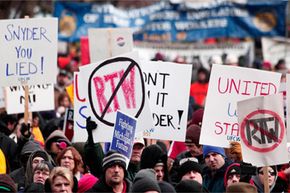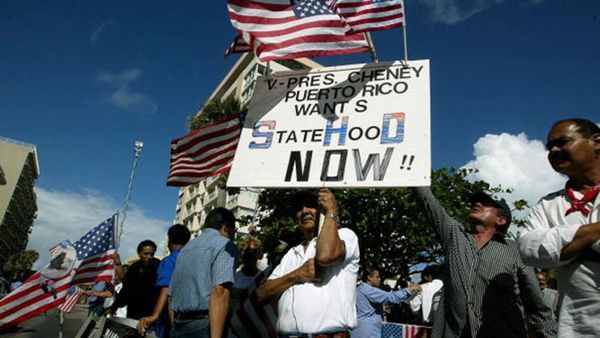On Dec. 11, 2012, Michigan became the 24th state in the U.S. to adopt right-to-work legislation, which stipulates employees can't be required to join (or not join) a labor union as a condition of employment. They also can't be required to shell out dues to a labor union. While that may sound rather innocuous, right-to-work laws are controversial.
Proponents say businesses are more likely to locate in states with right-to-work laws, thus creating more jobs. Further, they note people should have both the freedom to join a union, and the freedom to decline to do so.
Advertisement
Opponents say right-to-work laws intentionally weaken union power, leading to lower wages. Additionally, they say that unless union dues are mandatory, employees too often will freeload by enjoying the benefits of a union (like collective bargaining power) without paying for them [sources: Pearson, National Right to Work Legal Defense Foundation, Hartfield].
Florida enacted the first right-to-work law in 1943. At the time, unions were quickly becoming a potent force in America, with membership doubling (percentage-wise) between 1935 and 1945 [source: Pearson]. In 1947, the Taft-Hartley Act was passed, which affirmed states had the right to pass right-to-work legislation. During the 1940s and 1950s, a flurry of states adopted it: Alabama, Arizona, Arkansas, Georgia, Iowa, Kansas, Mississippi, Nebraska, Nevada, North Carolina, North Dakota, South Carolina, Tennessee, Utah and Virginia. Eventually union membership stagnated, then plunged, and approval of right-to-work legislation petered out. Between 1963 and 2001, for example, only five additional states enacted it -- Wyoming, Louisiana, Idaho, Texas and Oklahoma [sources: Pearson, U.S. Dept. of Labor].
By 2012, union membership was still at historically low levels. But right-to-work laws are making a comeback. Indiana adopted the legislation on Feb. 1, 2012, followed -- astonishingly -- by union stronghold Michigan. Several more states are considering right-to-work legislation, and there are signs that a national right-to-work bill may be brought before Congress in the not-too-distant future [source: Koba].
The resurgence of right-to-work legislation may be due to the economy, which has been sagging worldwide since 2008. Yet interestingly, no organization or study has definitively proven right-to-work laws help -- or harm -- the economy. A 2007 study by Dr. Lonnie Stevans, associate professor of information technology and quantitative methods at Hofstra University, found there were more businesses and self-employed people in right-to-work states, but employment, wages and personal per-capita income were lower on average. So businesses and their owners profited, but not the workers. ABC News compared seasonally adjusted unemployment rates from October 2012 in right-to-work states with those in states without the laws. It found average unemployment rates of 7 percent in right-to-work states versus 7.6 percent in the others. The study also noted that the states with the highest (Nevada, 11.5 percent) and lowest (Nebraska, 3.8 percent) unemployment rates are both right-to-work states [source: Hartfield].
It's important to remember adopting right-to-work legislation doesn't mean a state is anti-union, or that the two sides can't coexist. In right-to-work states, employees can still form unions, engage in collective bargaining and go on strike. Texas, for example, has a right-to-work law on its books, and is still home to Southwest Airlines, a company where 95 percent of the employees belong to a union [sources: Koba, Pearson]. Perhaps that's the most inspiring example of all.
Advertisement



